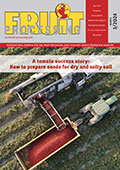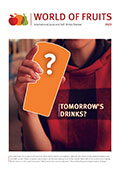Oterra, one of the the world’s leading suppliers of natural colours for food and beverage, announce the immediate launch of its Simply Brown range. Expertly crafted from apples, the new range heralds a new era in Oterra’s clean label caramel replacement solutions as part of their flagship FruitMax® colouring food range.
While caramel has long been a food colouring staple, changing consumer preferences show the need for clean brown replacements. A recent study showed over 25 % of consumers actively avoid foods with additives due to healthier eating, while 56 % will pay more for products bearing a ’natural’ label. Oterra’s Simply Brown range, which includes four products, a powder, and liquid for human consumption, and two pet products, answers this demand by utilising a gentle cooking process that results in rich, stable natural brown shades without the unwanted caramelisation.
Food and Beverage manufacturers who utilise Oterra’s Simply Brown range meet clean label requirements by being able to list the colours on packaging as ‘Apple concentrate’ in the EU or ‘Fruit juice (colour)’ in the US. In contrast to certain caramel replacements, such as malt, Simply Brown is also gluten-free, and devoid of 4-MEI and sulfites, making it an even more attractive alternative for health-conscious consumers.
The range is ideally suited for bakery, cereal, snack, and savory applications, given ist exceptional stability, even in high pH and high-temperature environments. Furthermore, it is perfect for use in dairy applications, as it delivers that classic chocolate milkshake appearance without interfering with other proteins and minerals in the mixture.
Clean and clear labeling concerns are now well established in the food and beverage industry, having featured as a key and running theme through all Innova Market Insights’ Top Trends forecasts in recent years. More than ten years ago ‘Go Natural’ led the Company’s annual top trends listing and since then clean label claims have developed and featured each year in different forms, increasingly weaving throughout the entire trends listings until they are now regarded as a given.
The term ‘clear labeling,’ which Innova Market Insights coined for its 2015 trends listing, has now fully entered industry parlance, being used in several company marketing campaigns, with new commitments on a clean or clear platform regularly.
Its increasingly mainstream status is illustrated in the fact that nearly 28 % of global food and beverage launches recorded by Innova Market Insights in 2018 used one or more clean label claims (natural, organic, no additives/preservatives and GMO-free), rising to nearly 39 % in the US.
There have also been associated rises in interest in related clean label areas such as vegan-friendly, raw and paleo diets, and also in the focus on minimal processing, including the use of techniques such as cold-pressing and high-pressure treatment. This is running alongside increasingly wide ethical concerns, including fair trade and sustainability, packaging, the environment, and animal welfare.
No additives/preservatives claims continue to feature most strongly, used for just over 15 % of global launches in 2018, rising to over 20 % in the US. The US generally sees higher levels of use of all types of clean label positionings and is also particularly notable for the strong position of GMO-free labeling. This featured on 17.8 % of launches, compared with under 6 % globally and was also the number two clean label claim in the US overall, well ahead of both organic on just over 13 % and natural on just over 8 %.
Flavor is still the number one factor influencing purchasing decisions, reports Lu Ann Williams, Director of Innovation at Innova Market Insights. “But it is clear that in recent years, the clean label trend has broadened out into a wider movement, focusing on an increasingly mindful consumer trying to make responsible food choices that are not only tasty and healthy but also sustainable and ethical.”
While interest in clean label has kept organic and GMO free claims in the spotlight in many countries, rising levels of competition mean that product offerings have had to become much more sophisticated, focusing more on value-added products and combining both specialist organic brands and organic and GMO free variants in existing conventional ranges.
Organic or GMO claims alone may not now be enough and companies are focusing on additional benefits including other related clean-label areas such as vegan-friendly, raw, and paleo diets, as well as local ingredients and sourcing, minimal processing and unusual and premium-style recipes and flavors, including the use of seasonal and limited editions.
Strengthened organization will focus on R&D project pipeline growth in ingredient and process development
DuPont Nutrition & Health announced it is expanding its R&D team by creating a “clean label hub” at the Brabrand facility. Intending to boost its project pipeline in healthy nutrition and clean label texturant offerings, six new employees will join the existing team to focus on both ingredient and process development.
The hub will feature experts with backgrounds in clean label and sustainability – two fields that often work together and serve related purposes. Working closely with existing project teams, the hub will bring products to market quickly and help grow the existing project pipeline.
“Clean label is about creating foods and beverages with ingredients that consumers recognize, feel good about putting into their bodies, and that respect the Earth and its resources,” said Gerard Lynch, R&D Leader, Systems & Texturants, Emulsifiers & Sweeteners. “Our ingredients are already used in many applications that consumers consider clean label, but there are tremendous opportunities to innovate – creating ingredients that are even more sustainable, using a larger part of the natural raw materials, while providing health benefits to consumers. Committing to this innovation is critical for our ongoing success and growth.”
With the ability to utilize the broadest capabilities in terms of natural raw materials access, processing, across fruits, vegetables, seaweeds and nutritional science, DuPont Nutrition & Health has huge potential to develop functional ingredients that meet consumer expectations.
The hub will help customers continue to navigate clean label trends in a proactive and sustainable way. DuPont Nutrition & Health is seeking creative scientists and engineers to identify ways to convert sustainable and natural raw materials into clean label solutions that meet consumer demands for simplicity and authenticity, all without compromising taste, texture and nutritional qualities.
Planned to be in place by early 2019, the clean label texturants team will have the opportunity to tackle exciting projects to provide texture and stability for multiple food applications.









